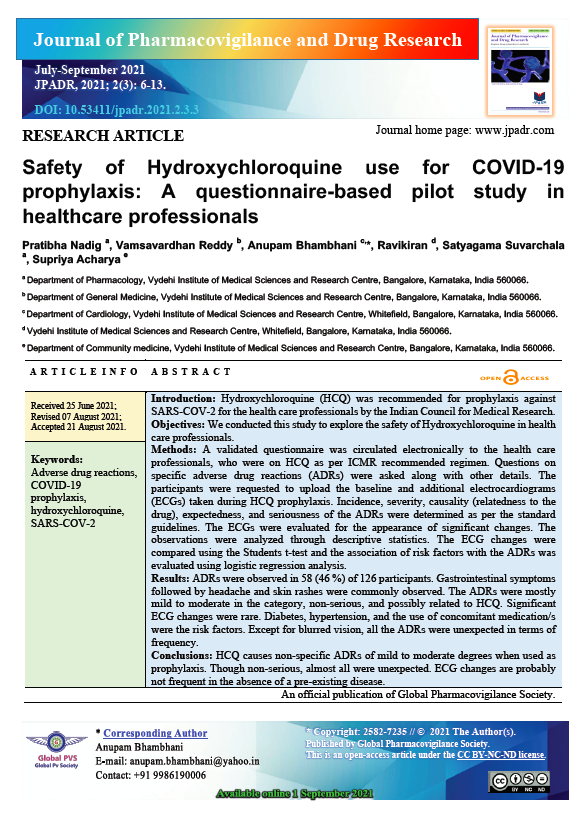Safety of Hydroxychloroquine use for COVID-19 prophylaxis: A questionnaire-based pilot study in healthcare professionals
Abstract
Introduction: Hydroxychloroquine (HCQ) was recommended for prophylaxis against SARS-COV-2 for the health care professionals by the Indian Council for Medical Research.
Objectives: We conducted this study to explore the safety of Hydroxychloroquine in health care professionals.
Methods: A validated questionnaire was circulated electronically to the health care professionals, who were on HCQ as per ICMR recommended regimen. Questions on specific adverse drug reactions (ADRs) were asked along with other details. The participants were requested to upload the baseline and additional electrocardiograms (ECGs) taken during HCQ prophylaxis. Incidence, severity, causality (relatedness to the drug), expectedness, and seriousness of the ADRs were determined as per the standard guidelines. The ECGs were evaluated for the appearance of significant changes. The observations were analyzed through descriptive statistics. The ECG changes were compared using the Students t-test and the association of risk factors with the ADRs was evaluated using logistic regression analysis.
Results: ADRs were observed in 58 (46 %) of 126 participants. Gastrointestinal symptoms followed by headache and skin rashes were commonly observed. The ADRs were mostly mild to moderate in the category, non-serious, and possibly related to HCQ. Significant ECG changes were rare. Diabetes, hypertension, and the use of concomitant medication/s were the risk factors. Except for blurred vision, all the ADRs were unexpected in terms of frequency.
Conclusions: HCQ causes non-specific ADRs of mild to moderate degrees when used as prophylaxis. Though non-serious, almost all were unexpected. ECG changes are probably not frequent in the absence of a pre-existing disease.
Downloads
References
Abella, B. S., Jolkovsky, E. L., Biney, B. T., Uspal, J. E., Hyman, M. C., Frank, I., Hensley, S. E., Gill, S., Vogl, D. T., Maillard, I., Babushok, D. V., Huang, A. C., Nasta, S. D., Walsh, J. C., Wiletyo, E. P., Gimotty, P. A., Milone, M. C., Amaravadi, R. K., & Prevention and Treatment of COVID-19 With Hydroxychloroquine (PATCH) Investigators (2021). Efficacy and Safety of Hydroxychloroquine vs Placebo for Pre-exposure SARS-CoV-2 Prophylaxis Among Health Care Workers: A Randomized Clinical Trial. JAMA internal medicine, 181(2), 195–202.
Borba, M., Val, F., Sampaio, V. S., Alexandre, M., Melo, G. C., Brito, M., Mourão, M., Brito-Sousa, J. D., Baía-da-Silva, D., Guerra, M., Hajjar, L. A., Pinto, R. C., Balieiro, A., Pacheco, A., Santos, J., Jr, Naveca, F. G., Xavier, M. S., Siqueira, A. M., Schwarzbold, A., Croda, J., … CloroCovid-19 Team (2020). Effect of High vs Low Doses of Chloroquine Diphosphate as Adjunctive Therapy for Patients Hospitalized With Severe Acute Respiratory Syndrome Coronavirus 2 (SARS-CoV-2) Infection: A Randomized Clinical Trial. JAMA network open, 3(4), e208857.
Chatterjee, P., Anand, T., Singh, K. J., Rasaily, R., Singh, R., Das, S., Singh, H., Praharaj, I., Gangakhedkar, R. R., Bhargava, B., & Panda, S. (2020). Healthcare workers & SARS-CoV-2 infection in India: A case-control investigation in the time of COVID-19. The Indian journal of medical research, 151(5), 459–467.
Chen, Z., Hu, J., Zhang, Z., et al. (2020). Efficacy of hydroxychloroquine in patients with COVID-19: results of a randomized clinical trial. MedRxiv, 2020.
Clinical Trial Registry India. Effect of hydroxychloroquine on QTc interval. Retrieved from : www.ctri.nic.in; accessed on 30/09/2020
Costedoat-Chalumeau, N., Hulot, J. S., Amoura, Z., Leroux, G., Lechat, P., Funck-Brentano, C., & Piette, J. C. (2007). Heart conduction disorders related to antimalarials toxicity: an analysis of electrocardiograms in 85 patients treated with hydroxychloroquine for connective tissue diseases. Rheumatology (Oxford, England), 46(5), 808–810.
Electronic Medicine Compendium. Hydroxychloroquine Sulfate 200 MG film-coated tablets –Summary of product characteristics (SmPC)-(emc) downloaded from https://www.medicines.org.uk/emc/product/11540 #UNDESIRABLE_EFFECTS accessed on 20/08/2020
FDA. (2020). Hydroxychloroquine or chloroquine for COVID-19: drug safety communication – FDA cautions against use outside of the hospital setting or a clinical trial due to risk of heart rhythm problems. Accessed July 9, 2020.
Gautret, P., Lagier, J. C., Parola, P., Hoang, V. T., Meddeb, L., Mailhe, M., Doudier, B., Courjon, J., Giordanengo, V., Vieira, V. E., Tissot Dupont, H., Honoré, S., Colson, P., Chabrière, E., La Scola, B., Rolain, J. M., Brouqui, P., & Raoult, D. (2020). Hydroxychloroquine and azithromycin as a treatment of COVID-19: results of an open-label non-randomized clinical trial. International journal of antimicrobial agents, 56(1), 105949.
Gerard, A., Romani, S., Fresse, A., Viard, D., Parassol, N., Granvuillemin, A., Chouchana, L., Rocher, F., Drici, M. D., & French Network of Pharmacovigilance Centers (2020). "Off-label" use of hydroxychloroquine, azithromycin, lopinavir-ritonavir and chloroquine in COVID-19: A survey of cardiac adverse drug reactions by the French Network of Pharmacovigilance Centers. Therapie, 75(4), 371–379.
Indian Council of Medical Research. (2020). Advisory on the use of Hydroxy-Chloroquine as prophylaxis for SARS-CoV-2 infection. MoHFW.
Keating, R. J., Bhatia, S., Amin, S., Williams, A., Sinak, L. J., & Edwards, W. D. (2005). Hydroxychloroquine-induced cardiotoxicity in a 39-year-old woman with systemic lupus erythematosus and systolic dysfunction. Journal of the American Society of Echocardiography : official publication of the American Society of Echocardiography, 18(9), 981.
Kulkarni, R., Kinikar, A., Jadhav, T. (2020). Adverse drug reaction profile of prophylactic hydroxychloroquine for COVID 19 among doctors. Medical journal of Dr. D. Y. patil vidyapeeth, 13(3), 204-207.
Liu, J., Cao, R., Xu, M., Wang, X., Zhang, H., Hu, H., Li, Y., Hu, Z., Zhong, W., & Wang, M. (2020). Hydroxychloroquine, a less toxic derivative of chloroquine, is effective in inhibiting SARS-CoV-2 infection in vitro. Cell discovery, 6, 16.
Mercuro, N. J., Yen, C. F., Shim, D. J., Maher, T. R., McCoy, C. M., Zimetbaum, P. J., & Gold, H. S. (2020). Risk of QT Interval Prolongation Associated with Use of Hydroxychloroquine with or Without Concomitant Azithromycin Among Hospitalized Patients Testing Positive for Coronavirus Disease 2019 (COVID-19). JAMA cardiology, 5(9), 1036–1041.
MoHFW. Updated Clinical Management Protocol for COVID-19, version-5” published on July 3, 2020 by the Ministry of Health and Family Welfare, Government of India. Retrieved from: www.mohfw.gov.in
Montastruc, J. L., Rousseau, V., Durrieu, G., & Bagheri, H. (2020). Serious adverse drug reactions with hydroxychloroquine: a pharmacovigilance study in Vigibase®. European journal of clinical pharmacology, 76(10), 1479–1480.
Nagaraja, B. S., Ramesh, K. N., Dhar, D., Mondal, M. S., Dey, T., Saha, S., Khan, M. A., Rutul, S. D., Pratik, K., Manjula, J., Sangeeth, T. A., & Singh, V. (2020). HyPE study: hydroxychloroquine prophylaxis-related adverse events' analysis among healthcare workers during COVID-19 pandemic: a rising public health concern. Journal of public health (Oxford, England), 42(3), 493–503.
Ponticelli, C., & Moroni, G. (2017). Hydroxychloroquine in systemic lupus erythematosus (SLE). Expert opinion on drug safety, 16(3), 411-419.
Rautaharju, P. M., Surawicz, B., Gettes, L. S., Bailey, J. J., Childers, R., Deal, B. J., Gorgels, A., Hancock, E. W., Josephson, M., Kligfield, P., Kors, J. A., Macfarlane, P., Mason, J. W., Mirvis, D. M., Okin, P., Pahlm, O., van Herpen, G., Wagner, G. S., Wellens, H., American Heart Association Electrocardiography and Arrhythmias Committee, Council on Clinical Cardiology, … Heart Rhythm Society (2009). AHA/ACCF/HRS recommendations for the standardization and interpretation of the electrocardiogram: part IV: the ST segment, T and U waves, and the QT interval: a scientific statement from the American Heart Association Electrocardiography and Arrhythmias Committee, Council on Clinical Cardiology; the American College of Cardiology Foundation; and the Heart Rhythm Society. Endorsed by the International Society for Computerized Electrocardiology. Journal of the American College of Cardiology, 53(11), 982–991.
Vincent, M. J., Bergeron, E., Benjannet, S., Erickson, B. R., Rollin, P. E., Ksiazek, T. G., Seidah, N. G., Nichol, S. T. (2005). Chloroquine is a potent inhibitor of SARS coronavirus infection and spread. Virology journal, 2(69), 1-10.
WH-UMC Scale. The use of WHO-UMC system for standardised case-causality assessment. Accessed on 05/05/2020
Yao, X., Ye, F., Zhang, M., Cui, C., Huang, B., Niu, P., Liu, X., Zhao, L., Dong, E., Song, C., Zhan, S., Lu, R., Li, H., Tan, W., & Liu, D. (2020). In Vitro Antiviral Activity and Projection of Optimized Dosing Design of Hydroxychloroquine for the Treatment of Severe Acute Respiratory Syndrome Coronavirus 2 (SARS-CoV-2). Clinical infectious diseases : an official publication of the Infectious Diseases Society of America, 71(15), 732–739.
Yilmazer, B., Sali, M., Cosan, F., Cefle, A. (2015). Sinus node dysfunction in adult systemic lupus erythematosus flare: A case report. Modern rheumatology, 25(3), 472-475.
Yun, I. S., Koo, M. J., Park, E. H., Kim, S. E., Lee, J. H., Park, J. W., & Hong, C. S. (2012). A comparison of active surveillance programs including a spontaneous reporting model for phamacovigilance of adverse drug events in a hospital. The Korean journal of internal medicine, 27(4), 443–450.

Copyright (c) 2021 Pratibha Nadig, Vamsavardhan Reddy, Anupam Bhambhani, Ravikiran, Satyagama Suvarchala, Supriya Acharya

This work is licensed under a Creative Commons Attribution-NonCommercial-NoDerivatives 4.0 International License.










